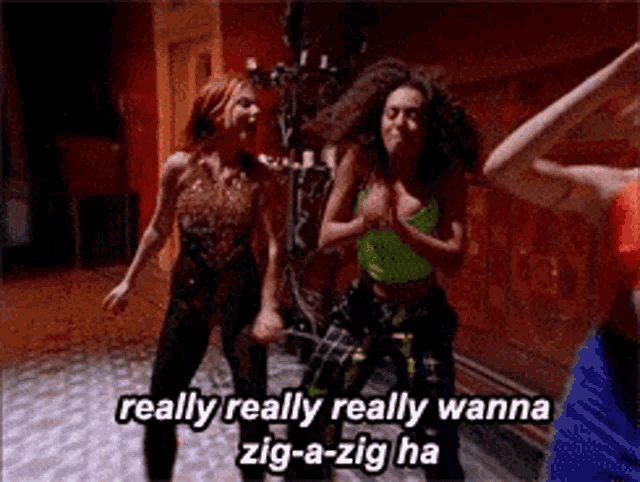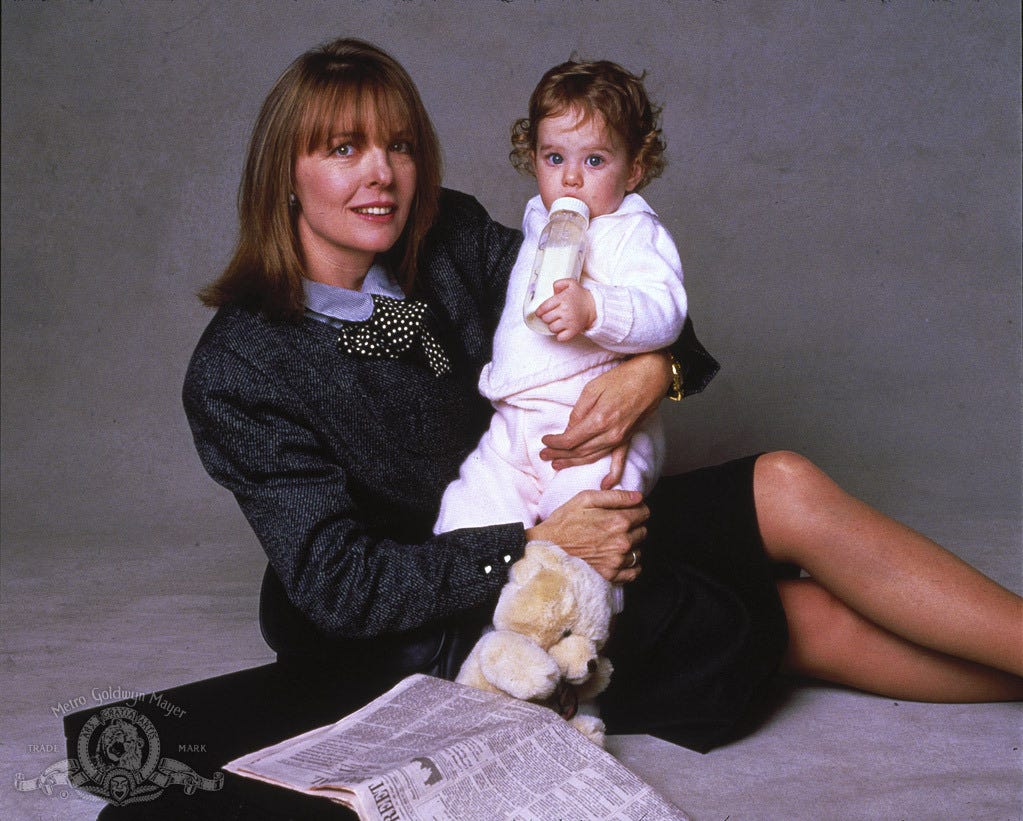An earlier version of this essay was published by Entropy (RIP) in early 2021: pre-MA, pre-PhD, pre-grief. A lot has changed since then… but my love for Baby Boom endures.
I always knew I was going places.
Growing up in an industrial city in the north of England, I spent hours in front of the television, devouring American shows and movies that suggested how glamorous and exciting my future could — and I assumed would — look.
Like the beginning of Baby Boom, when Diane Keaton strides across bustling Manhattan intersections in tailored separates and stilettos, or that scene in Pretty Woman where Julia Roberts strolls down Rodeo Drive, shopping bags bulging.
I pictured myself zipping along Santa Monica Boulevard in a red Alfa Romeo, the sun shining, my hair flying, car radio blasting Young Hearts Run Free.
If you’d asked where I was headed, exactly, I couldn’t have told you. But I knew university would take me there.
My parents taught me from an early age that higher education was the key to everything — a well-paid job, lifelong friendships, freedom to travel.
When they were ten, they’d each taken the Eleven Plus, an exam intended to measure educational potential that the British government made compulsory between 1944 and 1976.
Up to 25 percent of children passed and went on to grammar schools, with uniforms, Latin classes, and the promise of a professional career. The rest were sent to secondary modern schools and advised not to get their hopes up.
In working-class areas like the ones my parents came from, there were fewer grammar schools, which meant even fewer places.
My dad was a maths whiz and my mum was the best speller in her class but they both failed the exam and left school at 15 — my mum becoming a secretary, my dad a maintenance fitter.
They got degrees eventually, but neither of them had the opportunity to go to university until a few years after their divorce, when they were in their forties.
During a ceremony in my last year of sixth form, I was awarded the prize for English. Later one of the popular girls approached me and said, “I thought you were normal, I didn’t know you were clever.”
I was flattered, but it was enough that I knew.
Socially awkward, uncoordinated and prone to acne, I’d always derived my self-esteem from doing well academically and as arrogant as it sounds, I thought it made me better than other people — even my own parents.
Despite the fact that the protagonists of most of my favourite films and TV shows had to adapt to a reality that was different than what they’d planned, I assumed that anyone who had dreamed of an exciting life but settled for a conventional one just hadn’t tried hard enough.
I was certain that after I’d graduated from university, I would to move to London, become a dazzling success in publishing, journalism or advertising and get headhunted for a lucrative position in New York or Los Angeles.
A few months after the prize-giving ceremony, I hauled my TV, VCR and collection of romantic comedies to the sprawling countryside campus of a well-respected university in the north-west of England, a couple of hours from home.
That first day, my new roommates and I sat around our kitchen table and made stilted conversation.
The next night, though, the four of us pooled what little alcohol we had, pushed the table to one side and practised the choreography to Wannabe by The Spice Girls.
Lined up in front of the cabinets, arms crossed over our chests, we swung our hips and yelled: “I REALLY, REALLY, REALLY WANNA ZIG-A-ZIG AH!”
From then on, we were inseparable. We danced on tables in bars, downed shots before doing laundry and typed essays on portable word processors in the middle of the night, fuelled by chocolate and caffeine.
Occasionally I worried that I wasn’t getting enough sleep but I didn’t want to miss out on the fun or fall behind in my classes, so I pushed myself to keep going.
When my glands swelled up so much it hurt to speak, I put on a scarf and whispered my way through seminars on Walt Whitman and The Great Vowel Shift.
In our second year, we moved into off-campus housing. The notepads on my windowsill curled up from damp and showers wiped me out so much that I had to lie down for an hour before getting dressed.
I transferred as many activities as possible to my bed — studying, eating cereal in place of meals, staring uncomprehendingly at the Welsh-language TV shows my aerial picked up.
The first day back after Christmas break, I felt so weak and achy from walking between lectures that I packed a bag and caught the first train home.
At my mum’s house, I dragged a duvet to the couch and set up camp, too exhausted to do more than flick through gossip magazines and glance at daytime soaps.
I applied for a leave of absence from university on medical grounds and when I didn’t feel better after 12 months, received a kind but firm letter informing me I’d been unenrolled.
My GP put my physical symptoms down to depression and prescribed one anti-depressant after another, which did nothing for my muscle pain and lack of stamina.
Eventually, I saw a specialist who diagnosed me with Myalgic Encephalomyelitis/Chronic Fatigue Syndrome (ME/CFS), a neurological illness that can be triggered by the same virus that causes glandular fever, which I’d had when I was seventeen. While a small proportion of people recover, most never do.
My dad bought me a second-hand computer and I set up a blog about the margins of my life that weren’t taken up by illness, mostly reading and watching TV.
I started contributing to other sites and fell into a career as a freelance journalist, working from home in my pyjamas. Some days the words flowed, other times it felt like my mind was filled with candy floss. Every day the urge to lie down was like a gravitational pull.
I consulted nutritionists, yoga teachers, reiki practitioners, acupuncturists, and naturopaths, convinced that there was a treatment that could make me feel like I was 18 again.
Then I could get back on track and become the huge (if vaguely defined) success I was destined to be.
Whenever my faith wavered, I researched year abroad programs and visualised myself strolling under an arch of auburn leaves at Wellesley College on my way to a choral concert or a lecture about semiotics. No one I wrote for cared if I had a degree or not, but I still wanted one.
Ten years after I dropped out of university, I applied to the one in my hometown, a prestigious research institution with ivy-covered gothic buildings. It seemed like a sensible compromise.
I’d live alone but my mum would be thirty minutes away in case I needed help, my student loan would give me enough to live on and I’d meet new people outside of the internet. Plus, when I graduated, it would validate all the time I’d waited to do it properly.
That September, I moved into new student accommodation close to campus and nothing went to plan.
First, my electronic key didn’t work and when I finally made it inside, I discovered the shower wouldn’t drain. Over at the English department, I missed an introductory meeting because it was up five flights of stairs and the lift was broken.
My timetable had me starting at nine every morning, so I asked the disability liaison officer if I could swap a couple of seminars to give me time to rest but he said he couldn’t risk giving me an “unfair advantage”.
Worn out and overwhelmed, I kept messing up. I went to a phonetics seminar for a month before realising I should have been in the room down the hall.
One week, I got a message that a workshop had been moved to a building across town, so I caught the bus there and found nothing but empty rooms. It turned out it was the workshop before mine that had been rearranged. Mine was in its usual place, and I’d missed it.
Every night, I collapsed into bed as my back, feet and legs spasmed. My mum took over my washing and I skipped showers and ate from paper plates to save energy.
Six weeks into the semester I sat in a poetry workshop, staring at my desk as if that might stop the tutor, a graduate student called Rebecca, asking more questions about the use of metaphor in Carol Ann Duffy’s Mrs Midas.
Suddenly we were interrupted by an electronic wail: the fire alarm. The students around me leapt up and pushed their chairs aside. I eased myself out of my seat with a sigh, wondering how to tell Rebecca that I had a disabling illness so always used the lift and didn’t know what the protocol in this situation was.
“Um,” I started.
Rebecca swung her velvet bag over her shoulder, tucked her plaits behind her ears and glanced back at me as she dashed out the door.
“Don’t worry,” she said. “It’s probably a false alarm.”
As I followed her down six flights of stairs, she got smaller and smaller until I couldn’t see her anymore. Eventually I shuffled through the door to the quad, where everyone who’d been in the building was standing.
I’d just perched on a low wall when a member of staff came out and announced that there wasn’t a fire and we could go back up.
She yelled: “But you’ll have to use the stairs!”
I thought about slipping away and emailing Rebecca later to explain but I didn’t know whether she’d be sympathetic and I didn’t want to miss another class, so I huffed back up, hands gripping the railing, legs like rubber.
Back in the seminar room, my head pounded, my cheeks burned and my breath came in such short gasps I could barely speak. Afterward I stumbled back down, onto the bus and home to bed.
A few days later, I caught a cold that turned into bronchitis, which kept me awake until three in the morning, coughing up phlegm. I got one sick note from my doctor, then another.
Two months later, I filled in a leave of absence form again.
Back at my mum’s, I stacked boxes of books and bedding in front of my desk and spent most days on my bed, propped up on a mound of pillows, re-watching teen dramas.
My favourite was Gilmore Girls, which followed bookworm Rory (Alexis Bledel) and her charismatic single mother Lorelai, played by Lauren Graham.
Lorelai gave birth to her daughter when she was sixteen and then dropped out of school to become a maid at the local hotel, working her way up to manager. In a season two episode, “The Road Trip to Harvard,” they drive from their fictional Connecticut hamlet to Boston and take an unauthorised tour of the college Rory hopes to attend.
While her daughter sneaks into a philosophy lecture, Lorelai lingers in the hallway, studying photographs of former valedictorians. When she finds the pearl-wearing representative of the class of 1990, her lip quivers.
She was a good student and her parents are loaded: that could have been her. But she doesn’t dwell on it. As soon as she gets back into town, she calls her best friend Sookie and says they should move forward with plans to open their own inn.
The first time I watched the episode, years earlier, I’d thought it was tragic.
Lorelai’s new ambition seemed so mundane, especially when compared to going to Harvard.
Watching it again, I realised how wrong I’d been. People who let go of a dream don’t lie to themselves about how much they can do or lie around waiting for something to change.
They wake up. They move on.
That summer, the university sent me a Change of Status form with three all-caps choices: RETURN, SUSPEND or WITHDRAW. I sank onto my bed and tried to think of a fourth option.
I didn’t feel well enough to go back in September but if I postponed my return, I wouldn’t be eligible for another first-year loan and I didn’t have the £9000 it would cost.
I could drop out and re-apply for disability benefits or try to earn money from writing, but there was no guarantee I’d succeed at either, plus I’d have to pay back a study grant of £1800, which I’d already spent.
I walked over to the boxes in front of my desk and lifted the lid from one labelled “Textbooks.” When I picked up Contemporary Linguistics: An Introduction, a desiccated spider fell out.
What was I saving these for? Did I think someone was going to break down my door and demand I clarify the difference between voiced and voiceless fricatives?
When I pictured myself sitting through another lecture, I didn’t feel a flicker of interest. I didn’t want to study for a degree, I wanted to already have one.
I wanted it to have given me the extraordinary life to which I inexplicably felt entitled.
I sat back on my bed and leaned on Contemporary Linguistics as I traced a soft check mark in the WITHDRAW box.
I thought about all the time I’d spent on applications, how much money I was going to owe and the future I’d longed for, with its stilettos and sports car.
Then I remembered how I’d turned up to those wrong rooms, drowning in cortisol, my brain like Teflon for details.
I inked over the check mark until it was undeniable. I wasn’t going back. I wasn’t going to stroll under an arch of auburn leaves at Wellesley College on my way to a choral concert or a lecture about semiotics.
I wasn’t going to zip along Santa Monica Boulevard in a red Alfa Romeo, the sun shining, my hair flying, car radio blasting Young Hearts Run Free.
I couldn’t imagine what might happen next.








"People who let go of a dream don’t lie to themselves about how much they can do or lie around waiting for something to change."
THIS. So much this. We're not "giving up" or "being negative" or "in need of manifesting" - we are adapting. We shouldn't have to, but we do.